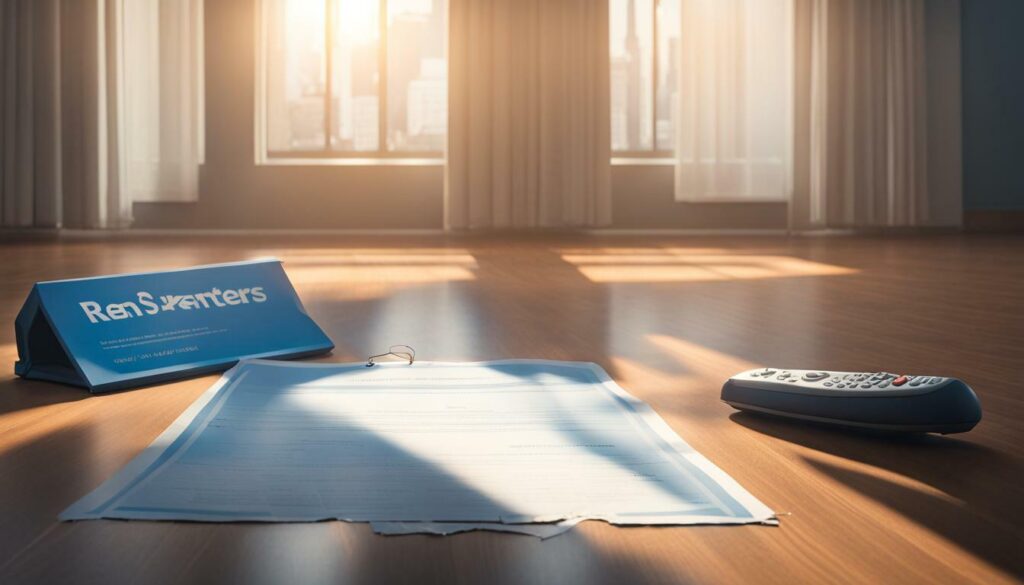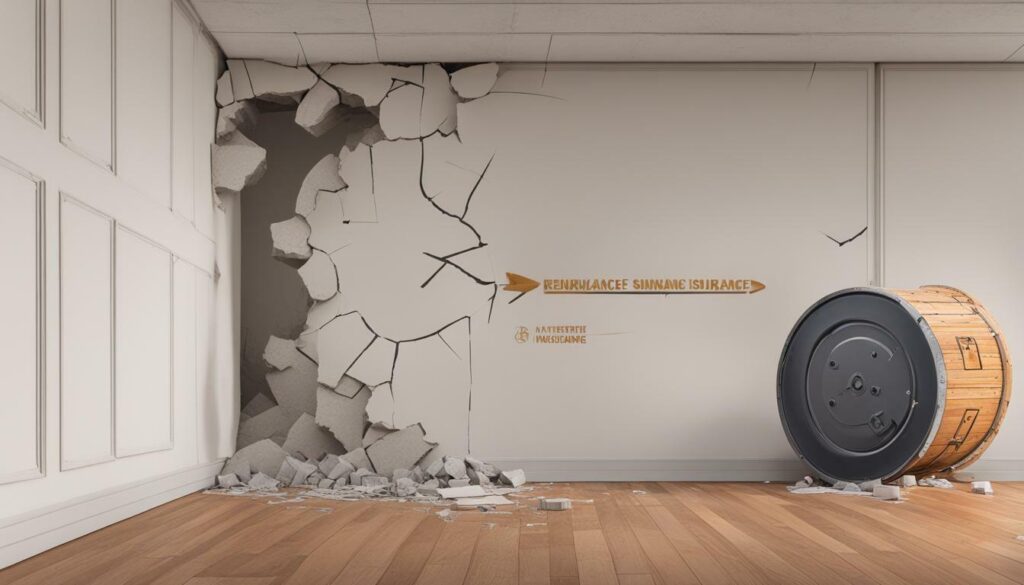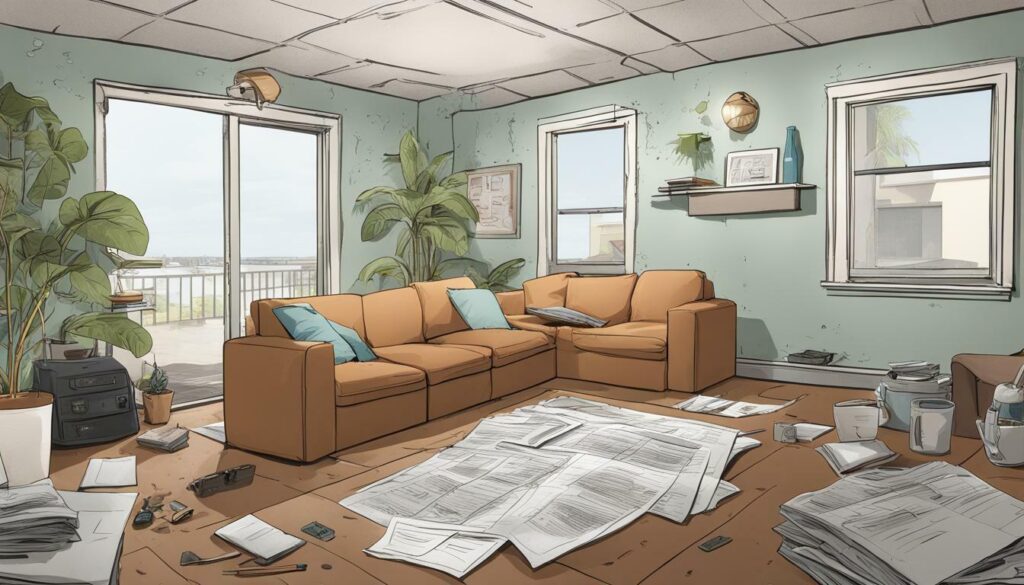If you’re a renter and you own a TV, you may be wondering if your renters insurance covers a broken TV. It’s a common question, and the answer is not always straightforward. In this section, we’ll provide an overview of renters insurance coverage and explain what renters should know about coverage for broken televisions.
Renter’s insurance is designed to protect tenants from financial loss due to unexpected events, such as theft, damage, or natural disasters. It typically includes coverage for personal belongings, liability protection, and additional living expenses in case you need to temporarily relocate due to damage to your rental property.
But what about coverage for a broken TV? The answer depends on a few factors, such as the cause of the damage and the details of your policy. Let’s dive into the specifics.
Key Takeaways:
- Renters insurance is designed to protect tenants from financial loss due to unexpected events.
- Coverage for a broken TV depends on the cause of the damage and the details of your policy.
- Understanding your policy’s coverage limits and exclusions is essential for making informed decisions about coverage for broken televisions.
Understanding Renters Insurance
If you’re renting a home or apartment, it’s important to protect your personal belongings. Renters insurance is designed specifically for tenants like you, providing coverage for your possessions in case of theft, damage, or loss. While it may not be required by law, having renters insurance can give you peace of mind and protect you financially in case of unexpected events.
Renters insurance typically includes coverage for personal belongings such as furniture, clothing, and electronics. This coverage can extend to your broken TV, depending on the cause of the damage and the policy you choose.
It’s essential to understand what your renters insurance policy covers and what it doesn’t. For example, your policy may cover accidental damage to your TV but not damage caused by a flood or earthquake. Some policies may also have limits on coverage for specific items, including electronics. Understanding these details can help you choose the right policy and ensure you have adequate coverage for your needs.
Overall, renters insurance can provide valuable protection for your personal belongings, including your TV. Consider your coverage options carefully and select a policy that suits your needs and budget.
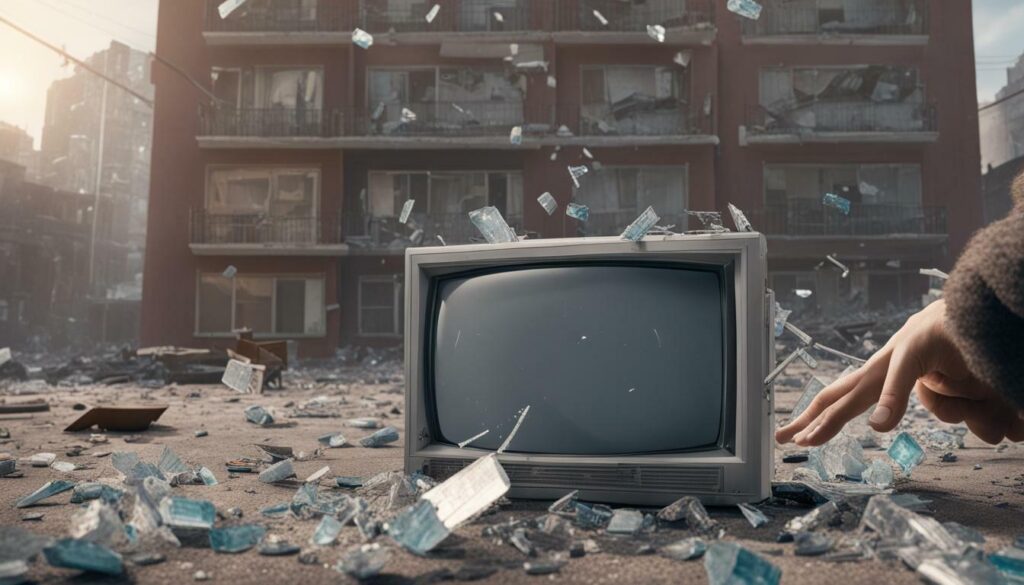

Coverage for Personal Belongings
Now that you have a better understanding of renters insurance, let’s dive into the specific coverage provided for personal belongings, including your television. Renters insurance typically covers damage to personal property caused by covered perils, such as fire, theft, and water damage. This means that if your TV is damaged due to one of these perils, you may be able to file a claim for the cost of repairs or a replacement.
It’s important to note that renters insurance also typically covers accidental damage to personal property, such as dropping your TV or spilling liquid on it. However, it’s essential to review your policy to confirm what types of accidental damage are covered.
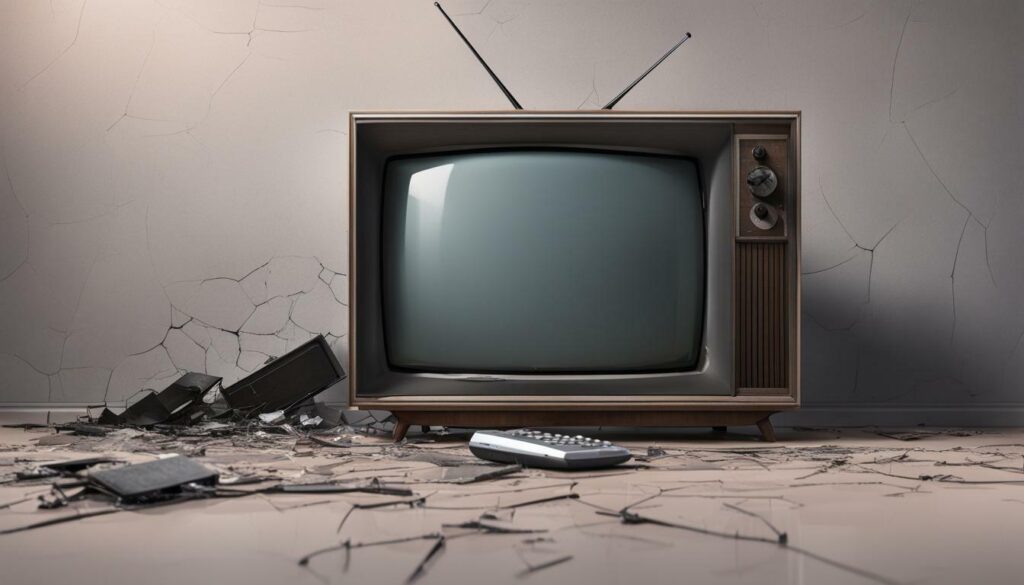

When it comes to your TV specifically, renters insurance may cover damage to the screen, internal components, or other parts of the television. The amount of coverage may vary based on the policy and the cause of the damage.
It’s crucial to document any damage to your TV with photos or videos and keep any receipts or documentation for repair costs or replacement. This can make the claims process smoother and more efficient.
Summary
Renters insurance can provide coverage for your personal belongings, including your television, in case of damage caused by covered perils or accidental damage. Make sure to review your policy to understand the specific coverage for broken televisions and document any damage for a smooth claims process.
Types of Damage Covered
If you’ve experienced a broken television, you may wonder if renters insurance covers the damage. In general, renters insurance policies cover accidental damage to personal belongings, including electronics like TVs. This means that if your TV was accidentally dropped, knocked over, or otherwise damaged, your renters insurance policy may cover the cost of repair or replacement.
It’s important to note that coverage may vary depending on the policy and the type of damage. Some policies may only cover accidental damage, while others may also cover theft or fire-related damage. Before filing a claim, make sure to review your policy and verify the specific coverage for broken televisions.
If you do need to file a claim for a broken TV, the process will vary depending on your policy and insurance provider. Typically, you’ll need to provide documentation of the damage, such as photos or a police report in the case of theft. You may also need to provide proof of purchase and the cost of repair or replacement.
Keep in mind that filing a claim for a broken TV may result in a higher insurance premium or deductible for future claims. Be sure to weigh the cost of repair or replacement against the potential impact on your insurance policy before submitting a claim.
In summary, renters insurance may cover accidental damage to your TV. It’s important to review your policy to understand the specific coverage for broken televisions and the process for filing a claim. Remember, maintaining a safe living space and taking preventative measures can also help minimize the risk of a broken TV and the need for a renters insurance claim.
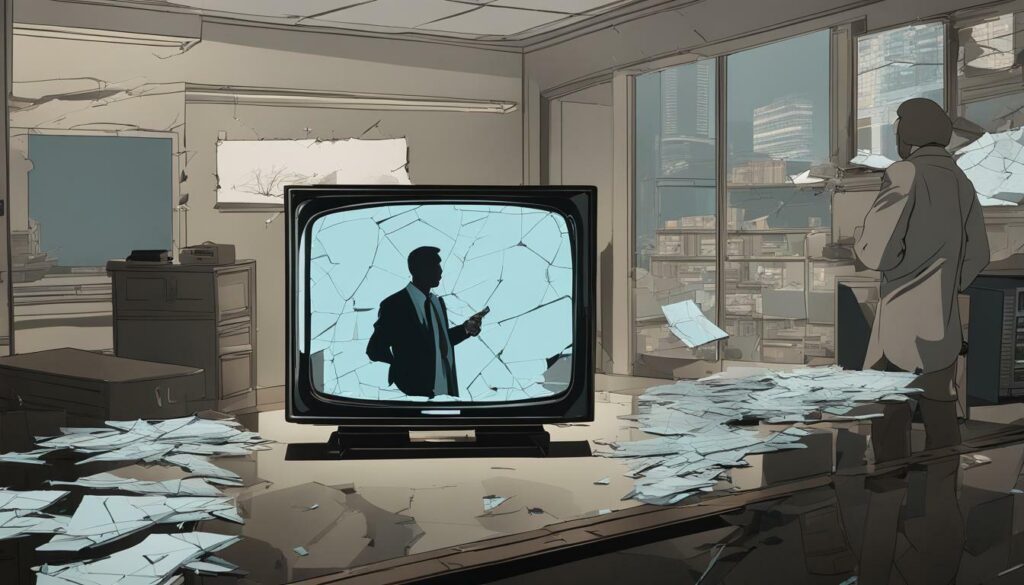

Policy Coverage Limits
It’s important to understand that renters insurance policies typically have coverage limits, meaning the maximum amount of money the insurance company will pay out for a claim. This can vary depending on the policy, so it’s essential to review your policy carefully to ensure you have the coverage you need.
When it comes to broken TV coverage, you’ll want to check the policy’s coverage limits to see how much you can be reimbursed for a damaged television. Keep in mind that if the cost of repair or replacement is greater than the coverage limit, you may be responsible for covering the difference out of pocket.
In addition to coverage limits, some policies may also have deductibles. A deductible is the amount you must pay out of pocket before the insurance company will provide any reimbursement for a claim. Make sure you understand your policy’s deductible and how it may affect your coverage for a broken TV.
When selecting a renters insurance policy, it’s essential to choose a coverage limit and deductible that align with your needs and budget. Consider the value of your personal belongings, including your television, when determining your coverage limit. Remember that paying a slightly higher premium for more coverage may be worth it in the long run if you experience a significant loss.
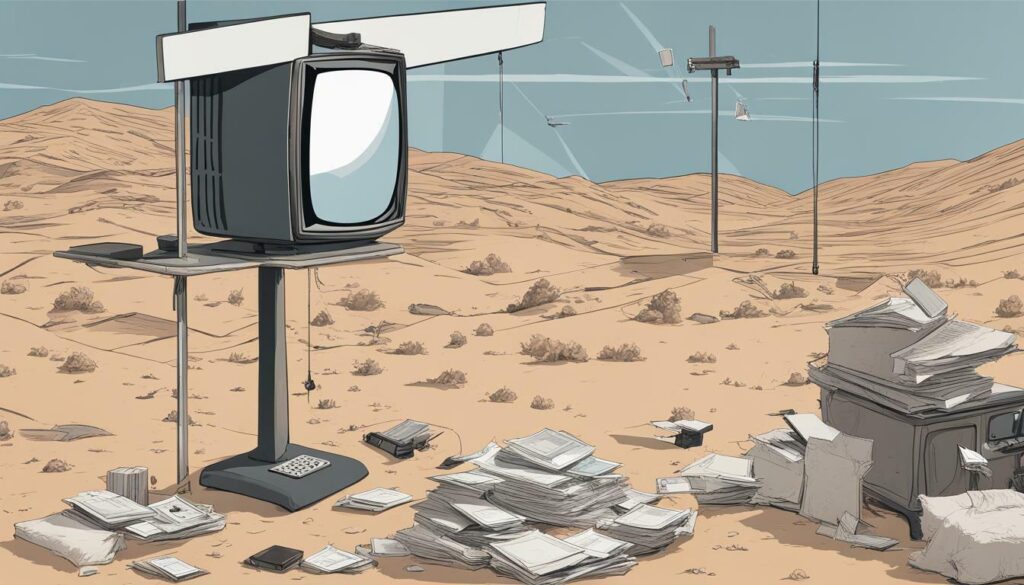

Deductibles and Reimbursement
When it comes to renters insurance, deductibles and reimbursement play a significant role in coverage for a broken TV. Your deductible is the amount you must pay out of pocket before your insurance kicks in. Generally, the higher your deductible, the lower your monthly premium.
If you file a claim for a broken TV, your insurance company will first verify that the loss is covered. If it is, they will then determine the value of the TV and any applicable deductible. From there, they will provide you with a reimbursement for the TV’s value, minus your deductible.
It’s important to note that reimbursement may not fully cover the cost of a new TV. Additionally, some policies may have limits on how much they will reimburse for a single item or category of personal belongings, such as electronics. Be sure to review your policy to understand any limitations or exclusions.
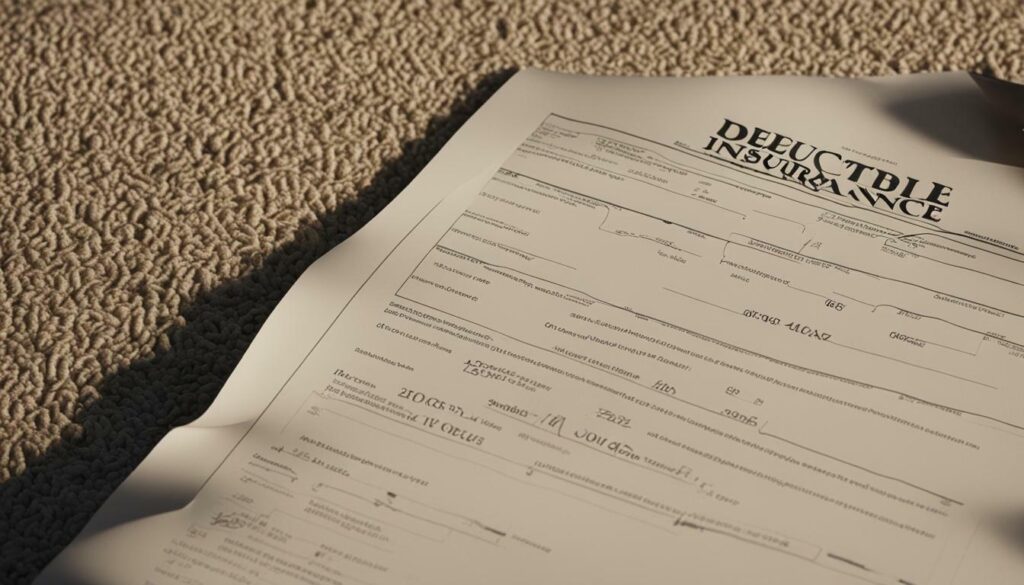

Additional Coverage Options
While standard renters insurance typically covers basic damage to personal belongings, you may also choose to add on specific coverage for your electronics, including TVs. This additional coverage can provide extra protection for your TV against accidental damage, theft, and other types of loss.
Keep in mind that adding on extra coverage will increase your renters insurance premium, but it may be worth the cost for the added peace of mind. Make sure to review the specifics of any additional coverage options before adding them to your policy.
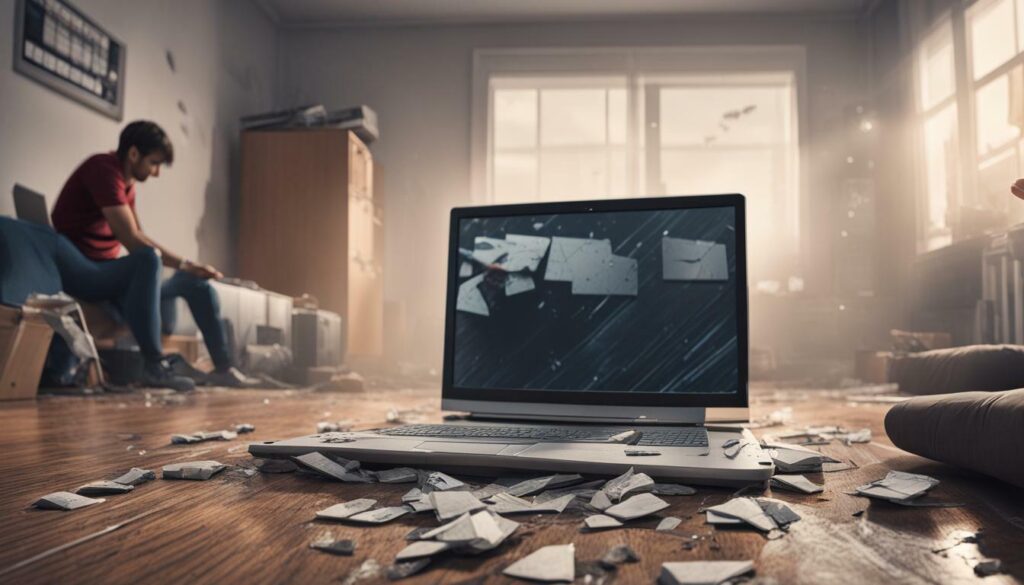

When selecting additional coverage options for your TV, consider how much coverage you may need and which types of damage you want to be protected against. Look for coverage that provides generous reimbursement amounts and minimal deductibles.
Some renters insurance policies may also offer reimbursement for temporary housing or living expenses if you experience a loss that makes your home uninhabitable. This can be especially beneficial if your TV is part of a larger loss that affects your entire living space.
By exploring additional coverage options, you can ensure that your TV is fully protected under your renters insurance policy.
Tips for Preventing TV Damage
If you want to avoid the hassle of filing a renters insurance claim for a broken TV, there are several things you can do to protect your television from damage.
Proper installation: Make sure your TV is installed correctly and securely. If you’re not sure how to do it yourself, consider hiring a professional to help you.
Secure mounting: If you’re mounting your TV on the wall, make sure it’s properly secured. Use a mount that is appropriate for the size and weight of your television.
Regular maintenance: Keep your TV clean and well-maintained. Dust it regularly and avoid placing it near sources of heat or moisture.
Careful handling: When moving your TV, handle it with care. Use a sturdy box or padding to protect it during transport.
By taking these steps, you can minimize the risk of a damaged TV and potentially avoid needing to file a renters insurance claim. However, accidents can still happen, and having renters insurance that covers broken TV is important for peace of mind.
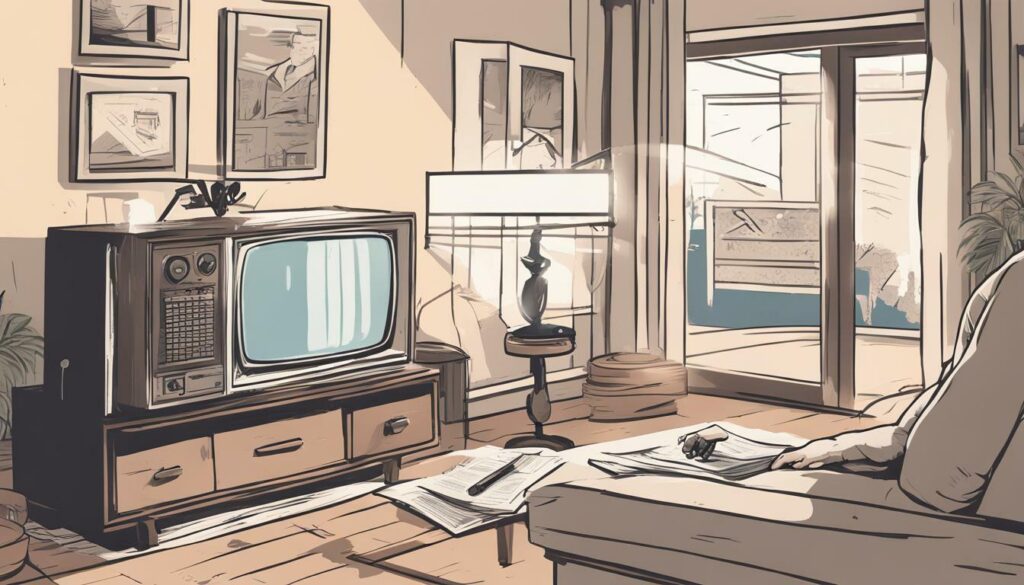

Common Exclusions
While renters insurance typically provides coverage for a variety of damages, there are some common exclusions that may affect coverage for a broken TV. It’s important to review your policy carefully to understand these limitations.
One common exclusion is intentional damage. If you or someone else intentionally damages your TV, it will not be covered by renters insurance.
Another exclusion is wear and tear. If your TV is damaged due to normal wear and tear over time, it will not be covered by renters insurance.
Additionally, flooding and earthquakes may also be excluded from coverage unless you specifically add on additional coverage for these types of damages. It’s important to review your policy to ensure you have adequate coverage for your needs.
Understanding these common exclusions can help you better assess your policy and ensure you have the coverage you need for a broken TV.
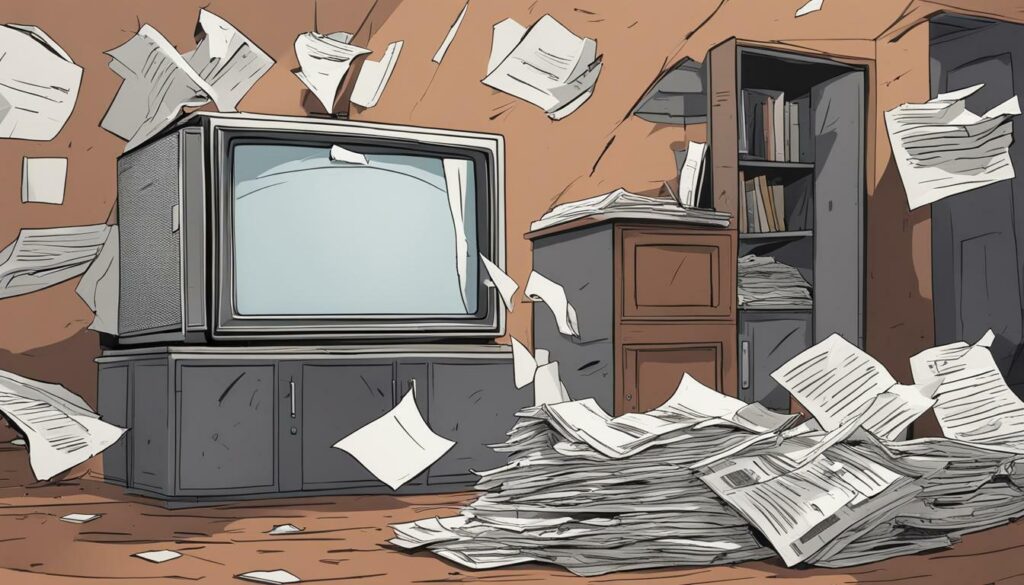

Replacing a Broken TV
If your TV is broken and you have renters insurance, the good news is that you may be able to get it replaced or repaired. Here are the steps you can take:
- File a claim: Contact your insurance provider as soon as possible to report the damage and start the claims process. Make sure to provide all the necessary information, including the cause of the damage and the estimated cost of repairs or replacement. Your insurer will guide you through the rest of the process.
- Select a new TV: If your claim is approved, you will need to select a new TV. Consider your needs and budget when choosing a replacement. Keep in mind that your insurance policy may have coverage limits, so make sure to check the amount you are eligible for.
- Understand reimbursement: Your insurance provider will likely reimburse you for the cost of the TV, minus your deductible. The amount you receive will depend on the policy coverage and the extent of the damage. Keep all receipts and other documentation related to the purchase and installation of the new TV to expedite reimbursement.
It’s important to note that the claims process may take some time, so be patient and keep all communication with your insurer clear and documented.
Remember, renters insurance is designed to protect your personal belongings, including your TV, from unexpected events. If you don’t have renters insurance yet, consider getting a policy to protect your belongings and give you peace of mind.
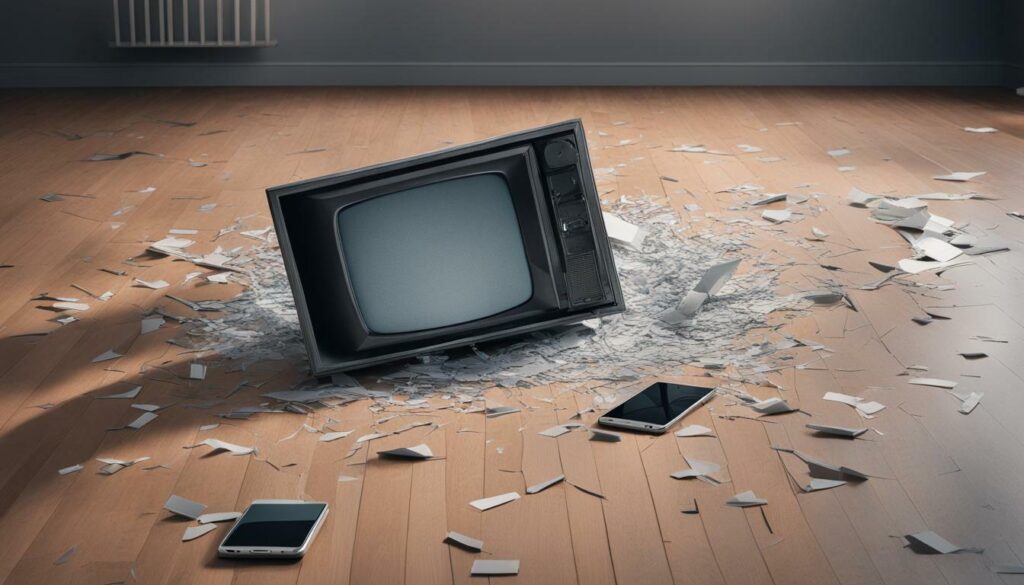

Reviewing Your Policy
Now that you understand the coverage for a broken TV under a renters insurance policy, it’s important to regularly review your policy to ensure it still meets your needs. Life changes, and so do your possessions and their value.
Make sure your policy aligns with your current situation and provides adequate coverage for your belongings, including electronics like televisions. In particular, check your policy’s limits and deductibles to ensure you can replace your TV if it gets damaged or stolen.
Reviewing your policy can also help you identify any exclusions that may affect coverage for a broken TV. Keep in mind that some policies may not cover certain types of damage or may have limits on reimbursement amounts.
By staying informed about your policy and making any necessary updates, you can ensure that you have the coverage you need to protect your personal belongings, including your TV, in the event of damage or loss.


Conclusion
Congratulations! You now have a better understanding of how renters insurance can protect your personal belongings, including your television. Remember, in most cases, renters insurance covers accidental damage to your TV, as well as theft and damage from fire or natural disasters. However, it’s important to review your policy to know exactly what is covered and what isn’t.
Review Your Policy Regularly
Make sure to review your policy regularly to ensure that you have adequate coverage for your belongings. If you’ve purchased new electronics, including a new TV, make sure to update your policy to reflect their value. By doing so, you can avoid any unpleasant surprises if something were to happen to your television.
Protect Your TV
While renters insurance can provide coverage for a broken TV, prevention is always better than cure. Take simple steps to protect your TV, such as mounting it securely or avoiding placing it in areas prone to accidental damage. Regular maintenance and upkeep can also help to extend the life of your TV.
Consider Additional Coverage Options
If you have valuable electronics, it may be worth considering additional coverage options that go beyond your basic renters insurance policy. Speak to your insurance agent about adding on specific coverage for electronics, such as your TV, to ensure that you have the protection you need.
Remember, by taking a proactive approach to protecting your personal belongings, you can enjoy the peace of mind that comes with knowing that you’re covered if something goes wrong. With renters insurance, you can have the confidence to enjoy your TV, knowing that it’s protected by a comprehensive policy.
FAQ
Q: Does renters insurance cover a broken TV?
A: Yes, renters insurance typically covers a broken TV. However, coverage may vary depending on the cause of the damage and the specific policy. It’s important to review your policy and contact your insurance provider for more information.
Q: What does renters insurance typically cover?
A: Renters insurance generally provides coverage for personal belongings, liability protection, and additional living expenses in case of a covered loss. It can help protect your belongings from events like fire, theft, and certain types of water damage.
Q: How do I file a renters insurance claim for a broken TV?
A: To file a renters insurance claim for a broken TV, you should contact your insurance provider as soon as possible. They will guide you through the claims process and may require documentation such as photos or receipts to support your claim.
Q: Are there any exclusions to coverage for a broken TV?
A: Yes, there may be certain exclusions in renters insurance policies that can impact coverage for a broken TV. These exclusions can vary between policies, so it’s important to carefully review your policy and understand any limitations or exceptions.
Q: How much will I be reimbursed for a broken TV?
A: The amount of reimbursement for a broken TV will depend on your policy’s coverage limits and deductible. It’s recommended to review your policy and contact your insurance provider to understand the specific details of your coverage.
Q: Can I add additional coverage for my TV?
A: Some insurance companies offer additional coverage options for electronics, including TVs. These options may provide extended coverage or specific coverage for accidental damage. You can contact your insurance provider to inquire about adding this type of coverage to your policy.
Q: How can I prevent damage to my TV?
A: To prevent damage to your TV, consider proper installation, secure mounting, and regular maintenance. Avoid placing heavy objects on top of the TV, keep it away from water sources, and use surge protectors to protect against power surges.
Q: Should I review my renters insurance policy?
A: Yes, it’s important to regularly review your renters insurance policy to ensure it still meets your needs, including coverage for a broken TV. Life circumstances and valuable possessions may change, so reviewing your policy can help you make any necessary updates.

